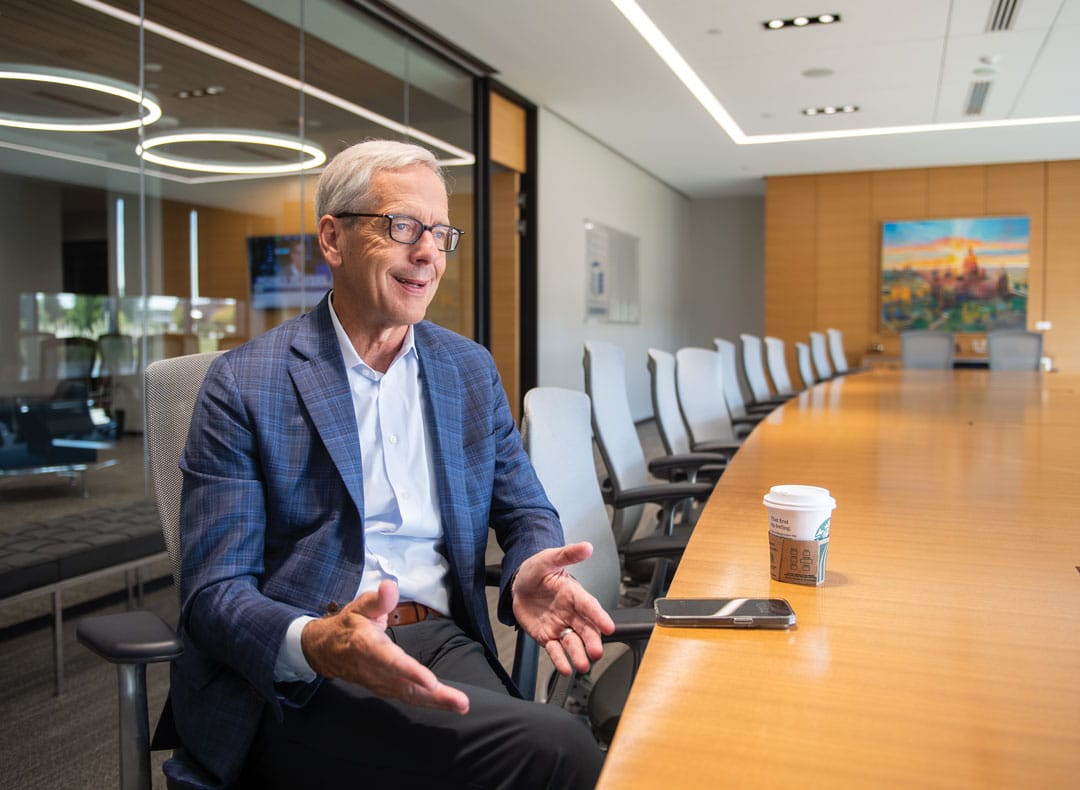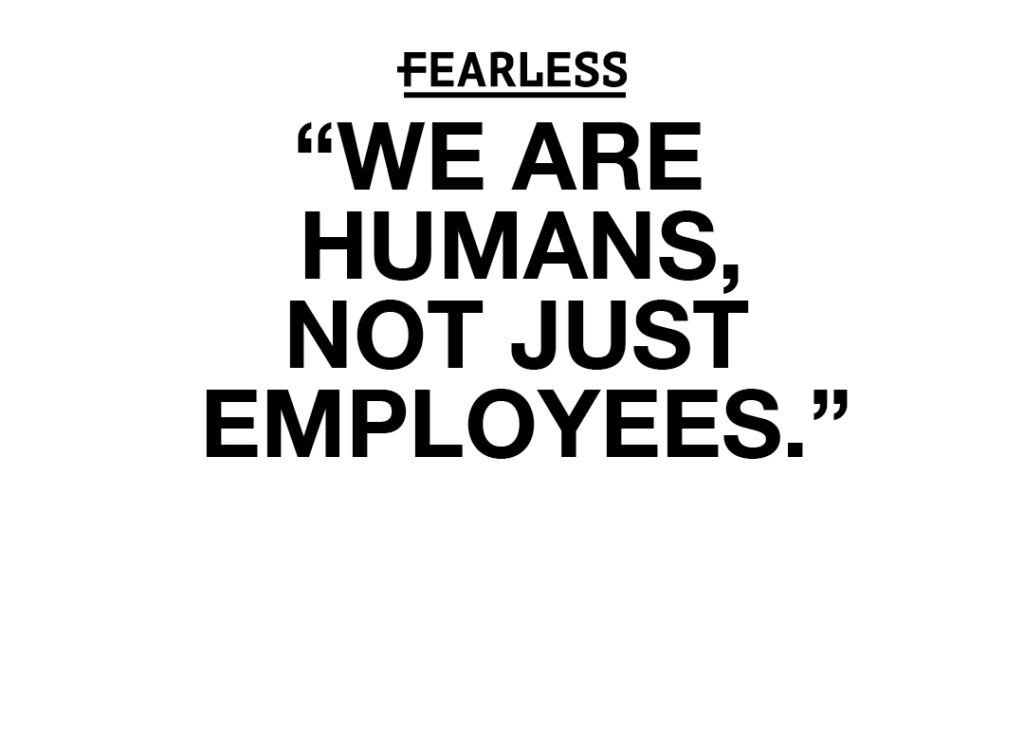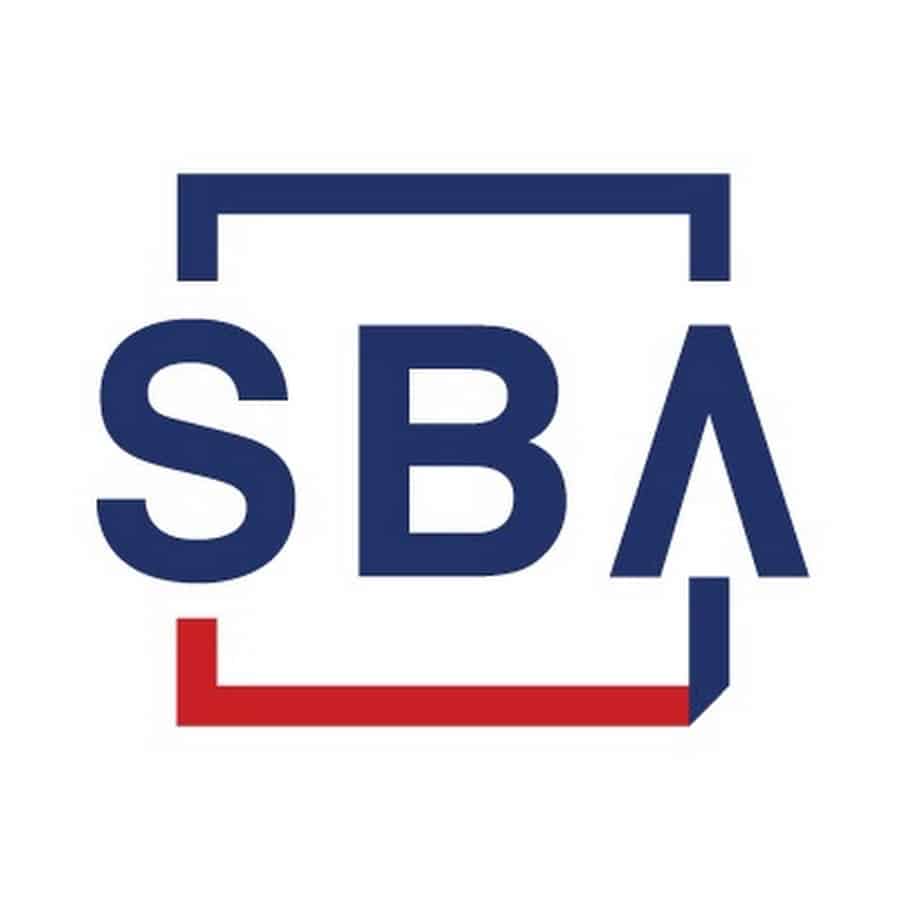Sorensen talks about years as IBA’s president, CEO

Kathy A. Bolten Oct 11, 2024 | 6:00 am
7 min read time
1,609 wordsBanking and Finance, Business Record Insider, Statewide NewsJohn Sorensen knew how to organize a spreadsheet when he joined the Iowa Bankers Association 38 years ago but little about banking.
Sorensen was an accounting major at the University of Northern Iowa and worked at the State Auditor’s Office for a couple years before joining the staff of the Iowa Corn Growers Association. He joined the bank association in 1986, and in 1997, was tapped to become its president and CEO.
“Everything I learned about banking, I learned through osmosis,” said Sorensen, 66, who will retire at the end of the year. “When I started my career, I was more focused on audits.”
Under Sorensen, the association has grown to become the largest state banking association in the U.S. The organization, which has a staff of over 200 people, provides advocacy, workforce development and community bank solutions in insurance, mortgage and regulatory compliance. The association has 265 member banks, with a presence in nearly every Iowa community.
When Sorensen became the association’s CEO and president, Iowa had about 650 bank charters, he said. Now, Iowa has about 240 bank charters.
“We’ve seen a lot of consolidations in the past 28 years,” Sorensen said. “But even though there’s been consolidation, the number of banking locations continued to grow, at least until recently.”
The move to online banking has meant the need for fewer physical bank branches, Sorensen said.
Sorensen said one of the biggest challenges he’s faced in the past 28 years was helping develop a community banking model that was able to compete fairly and equitably with institutions that were larger.
“Challenge No. 1A has been getting regulators and policymakers to tier regulations so that smaller institutions don’t face a lot of the regulations that larger institutions do,” Sorensen said. “Regulatory tailoring is critical to the survival of small institutions who primarily serve our small businesses.”
We recently caught up with Sorensen.
The following Q&A has been edited for clarity and brevity.
Looking forward, what are some of the challenges that will face your successor, Adam Gregg?
I think part of it is the changing technology — the changing way Iowans want to receive financial services today. We need to continue to empower community banks to play in those areas, whether that means relationships with fintech companies and how they might structure those community banks in order to compete with the larger institutions in the country. We will need partners to make that happen. Part of what we need to do is make sure they’re educated in what those opportunities are. We need to make sure our regulators are educated too, so that they don’t stand in the way of those partnerships.
There are other, what I would call more existential issues, related to banking. For example, cryptocurrency and what that means for the future of the intermediary in what we’ve traditionally had for a banking system. Today, that’s OK, but there are issues around maybe a central bank digital currency, which is being discussed by many countries across the globe. Some countries have pursued that more vigorously than we have here in the United States. How would that be structured? What’s that mean for a banking intermediary? Does that mean the Fed would have individual consumer accounts? There are a lot of really existential issues related to the future of banks in Iowa.
Talk a little bit about the role of artificial intelligence in banking.
AI is certainly becoming a part of how we serve our customers today. It will be more significant in the future. We need to make sure that no matter how we’re doing that, we’re still being fair and that whatever product is being offered, it’s available to everyone.
Anything else that you haven’t mentioned?
The one thing I haven’t mentioned yet is the change I’ve seen on the regulatory front. Our regulators have become much more political than they used to be. Banking regulators used to be independent appointments, looking out for the safety and soundness of the industry and protecting depositors. That was their primary focus. In recent years, there have been strict requirements that are part of the code, but we’re seeing regulators improvise in a more political way.
How does that affect the average consumer?
An example might be ESG. Don’t get me wrong, there are benefits to environmental, social, governance matters, and looking at those and making sure you’re doing things in the right way. But at the end of the day, banks can’t just lend to Republican-favored groups or Democratic-favored groups. We should be independent providers of credit that make decisions on sound underwriting. We have laws in place today that say banks can’t discriminate. We’re examined every 18 months and monitored on a regular basis to make sure that does not happen. There are already things in place from the banking industry standpoint, to assure that we’re providing credit to everyone. There are also community reinvestment laws that [ensure] we’re serving the whole community. It’s coming from both sides — the right and the left — that are raising some of these issues and trying to pass laws or regulations that will target our allocating credit in a way that I haven’t seen before in my career.
When you became president and CEO of the Iowa Bankers Association, what advice were you given that’s helped you through the past 28 years?
That this is a relationship-building business. A big part of this role is communicating with the public, your membership, policymakers, the media, and telling the story about your industry and why it’s important to your state. I think as long as we focus on that and remember that we’re in it to help the state be better [and] to help our members be successful in serving their communities. I’ve always told our board of directors to remember what our mission is: to make our banks successful in serving their communities. If we’re doing something that doesn’t align with that mission, you should tell us to stop. I think if I’ve done anything right over the 28 years I’ve been CEO, it is probably keeping that the focus.
Is that also your advice to Gregg?
I wouldn’t stray a lot from that. Adam, even though he has a number of relationships that he’s built having been lieutenant governor of the state of Iowa, he’ll also build banking relationships. He’ll spend the next 180 days understanding our members better and getting in front of them as a trade association. One of the really good things we have going for us is that we’re very close to our customers. We know them well, and we know their needs well. My advice to [Adam] is to get in front of bankers, get to know them, get to know their needs, and then understand the capabilities the IBA has to address those [needs]. If he continues to tap into those things, he will do well.
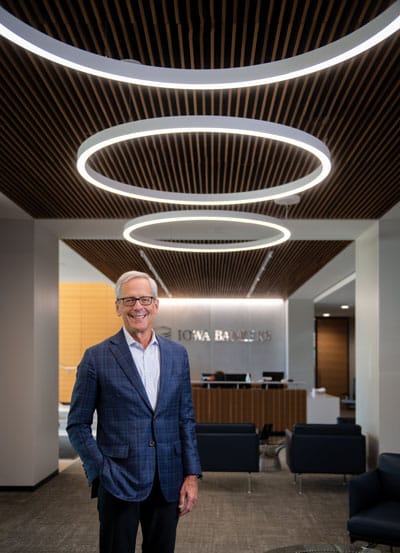
What are you going to miss most about this job?
I will miss the people. Over a lifetime of work, we all develop friendships, especially when you’re at the same place for that long of a period of time. Many times, your co-workers become your friends. A piece of advice I got early on in my career was that you can’t be friends with the people you work with, and that’s wrong. You can be friends. Obviously, you need to maintain a professional relationship, but you definitely develop friendships over the years. A big reason I’ve had any success here is because of the people I’ve been able to work with — both our volunteers and our staff.
What won’t you miss?
The regiment. We have a series of meetings that we do throughout the year. That’s how you get out and meet people, which is important, but the point is, my whole year is scheduled. I won’t miss that part of it. I will have more flexibility, which will open up time to do other things.
What are your plans after retirement?
I will stay engaged in the industry. I’m planning to be on a bank board of directors. I will not lose my connection to banking. I’m currently on [Iowa Public Broadcasting Service’ Foundation] board of directors and I’m on some other economic development boards. I’ve been on a number of not-for-profit boards over the years, and I really want to lean into my service of giving back. I take great satisfaction from that when I can carve time out of my schedule to do that. I hope that that will become my primary purpose. I want to spend more time with my family, obviously. We have two [grown] kids in town, and our granddaughter, who we spoil to death, is here. My wife and I will certainly do some traveling and some other things that we haven’t been able to do because of my schedule for the past 28 years.
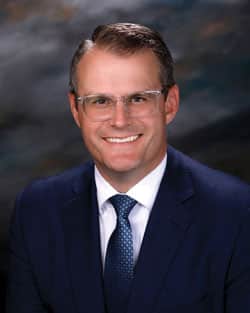
Sorensen’s successor
Adam Gregg, Iowa’s former lieutenant governor, will become president and CEO of the Iowa Bankers Association in January.
John Sorensen, the organization’s current president and CEO, is retiring at the end of the year after 38 years with the group, 28 of which as its leader.
Gregg’s first day at the association was Oct. 1. He is working with Sorensen to learn more about the group and meet its members.
Gregg, 41, was Iowa’s lieutenant governor from 2019 until his resignation in early September. He was acting lieutenant governor from 2017 to 2019. Gregg graduated from Central College in Pella and Drake University Law School. He served as the public defender of Iowa from 2014 to 2017.

Kathy A. Bolten
Kathy A. Bolten is a senior staff writer at Business Record. She covers real estate and development, workforce development, education, banking and finance, and housing.

